Roronoa Zoro, the swordsman of the Straw Hat Pirates in the popular anime and manga series “One Piece,” is often depicted as a character who spends a significant amount of time sleeping. This recurring theme has intrigued fans and led to various interpretations about his behavior. While some may view his propensity for sleep as mere comic relief, a deeper examination reveals that it is intricately tied to his character development, training regimen, and psychological state. This article explores the reasons behind Zoro’s frequent slumber, delving into the nuances of his personality, his role within the crew, and the implications of his sleeping habits.
Zoro’s Characterization
Zoro is portrayed as a stoic and determined individual, driven by his ambition to become the world’s strongest swordsman. His character is defined by a strong sense of loyalty to his captain, Monkey D. Luffy, and a commitment to protecting his crewmates. However, beneath this tough exterior lies a complex psyche shaped by past traumas and an unwavering desire for strength.
The Role of Sleep in Zoro’s Life
1. Physical Recovery
Exhaustion from Training: Zoro is known for his intense training sessions, often pushing himself to the limits. The physical demands of training require substantial recovery time, which he compensates for through sleep. His body needs rest to rebuild muscle and regain energy after rigorous workouts.
Combat Readiness: As a fighter constantly on guard for potential threats, Zoro’s sleep patterns reflect a strategic approach to maintaining his combat readiness. He often takes short naps during the day to ensure he is alert and prepared for any confrontation.
2. Psychological Factors
Coping Mechanism: Zoro’s frequent sleeping can also be interpreted as a coping mechanism for dealing with stress and anxiety. The weight of his responsibilities as a protector of the crew can be overwhelming, leading him to retreat into sleep as a form of escape.
Fear of Weakness: Zoro harbors an intense fear of not being strong enough to protect those he cares about. This anxiety can manifest in various ways, including excessive training and subsequent fatigue that necessitates more sleep.
3. Symbolism of Sleep
A Character Trait: Within “One Piece,” Zoro’s tendency to sleep through chaos serves as a comedic element but also symbolizes his confidence in his abilities. His ability to remain undisturbed during tumultuous events illustrates not only his strength but also an unwavering belief in himself and his crewmates.
Contrast with Crew Dynamics: Zoro’s sleeping habits often contrast sharply with the more energetic personalities of other crew members like Luffy and Sanji. This juxtaposition highlights different approaches to adventure and conflict within the crew dynamic.
See Also: What Is The Most Iconic Zoro Scene?
Narrative Function of Sleep
Zoro’s sleep serves multiple narrative functions within “One Piece.” It provides comic relief during tense moments and underscores key themes such as resilience and determination.
1. Comic Relief
Zoro’s ability to sleep through significant events—such as battles or natural disasters—adds humor to the storyline. His obliviousness often leads to amusing situations that lighten the mood amidst serious arcs.
2. Character Development
As the series progresses, Zoro’s relationship with sleep evolves alongside his character development. His occasional moments of wakefulness during critical situations reveal layers of depth in his character, showcasing his instincts and commitment despite appearing lethargic.
3. Foreshadowing and Tension Building
Instances where Zoro sleeps during critical moments can serve as foreshadowing for future events or build tension in the narrative. The audience is left wondering whether he will awaken in time to respond to impending danger.
Cultural Context
Zoro’s sleeping habits can also be examined through cultural lenses. In Japanese culture, there is a concept known as “inemuri,” which refers to the practice of napping in public spaces or during work hours. This practice reflects a strong work ethic where individuals prioritize productivity over conventional notions of rest. The concept suggests that taking short naps can signify diligence rather than laziness. In this context, Zoro’s naps could be viewed as a cultural commentary on balancing hard work with necessary rest.
Conclusion
Zoro’s frequent sleeping is more than just a quirk; it encapsulates various aspects of his character—from physical recovery needs due to intense training to psychological coping mechanisms for anxiety related to strength and responsibility. His ability to sleep through chaos serves not only as comic relief but also enriches narrative depth by highlighting themes of resilience and loyalty. Through this multifaceted portrayal, Zoro emerges not only as a formidable swordsman but also as a complex character navigating the challenges posed by both external threats and internal struggles. Ultimately, understanding why Zoro sleeps so much offers valuable insights into his character arc within “One Piece,” revealing how even the strongest warriors must find balance between their ambitions and their need for rest.
Related Topics
How Tall Is Roronoa Zoro In One Piece?
How Powerful Is Roronoa Zoro In One Piece?
Who Is Zoro’s Father In One Piece?


